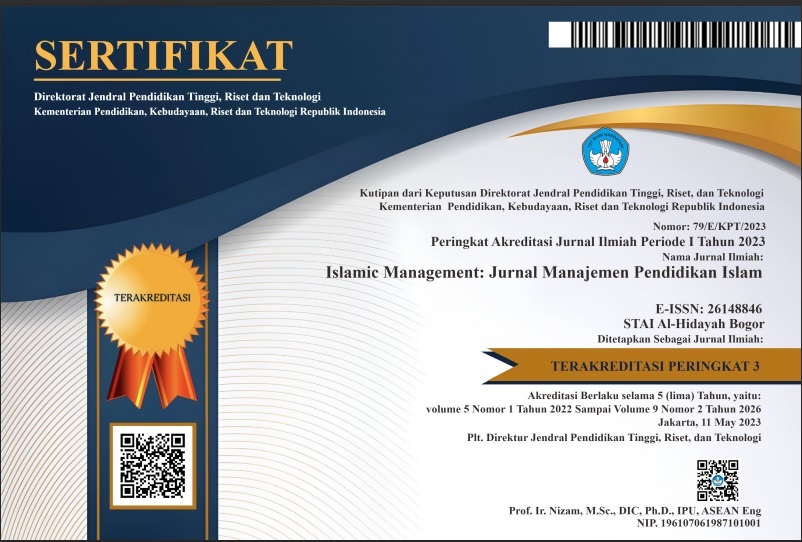SERVANT LEADERSHIP IN THE DEVELOPMENT OF PROFESSIONALISM
DOI:
https://doi.org/10.30868/im.v7i001.7616Keywords:
Servant Leadership, Professionalism, Work MotivationAbstract
This research aims to describe professionalism and performance. understand the relationship between service leadership and performance. This research uses a literature study method by observing various kinds of documents from both books and journals. The literature study in this research focuses on researching literature related to servant leadership in professional development. Data collection is carried out by collecting library data, reading, recording and managing research results objectively, systematically, analytically and critically by looking at the year of publication and the most recent research. The results of this research show. Servant leadership can be applied to increase professionalism in the workplace and influence the personality and work motivation of employees
References
Amir, D. A., & Sallatu, M. A. (2022). The Influence of Servant Leadership on Subordinates' Motivation in Serving the Public: The Mediating Role of Personality Agreeableness (Study of Public Organizations in Indonesia). Journal of Business and Economics, 29(1), 52–65. https://doi.org/10.35315/jbe.v29i1.9009
Apriani, R., Azizah, N., & Nasution, A. (2021). Theory and Implementation of Multicultural Education in Madrasah Aliyah Negeri 1 Medan Model. 5(1).
Barrick, M. R., & Mount, M. K. (1991). The Big Five Personality Dimensions and Job Performance: A Meta‐Analysist. Personnel Psychology, 44(1), 1–26. https://doi.org/10.1111/j.1744-6570.1991.tb00688.x
Brewer, C. (2010). Servant Leadership: A Review of Literature. Servant Leadership, 2.
Brown, M. E., Treviño, L. K., & Harrison, D. A. (2005). Ethical leadership: A social learning perspective for construct development and testing. Organizational Behavior and Human Decision Processes, 97(2), 117–134. https://doi.org/10.1016/j.obhdp.2005.03.002
Coetzer, M., Bussin, M., & Geldenhuys, M. (2017). The Functions of a Servant Leader. Administrative Sciences, 7(1), 5. https://doi.org/10.3390/admsci7010005
Deci, E. L., & Ryan, R. M. (2000). The “What” and “Why” of Goal Pursuits: Human Needs and the Self-Determination of Behavior. Psychological Inquiry, 11(4), 227–268. https://doi.org/10.1207/S15327965PLI1104_01
Dimas Ardi Nugraha, Ananta Fani Aprilia, Robiatul Awaliyah, & Mochammad Isa Anshori. (2023). Servant Leadership: A Literature Review. Jurnal of Management and Social Sciences, 1(3), 109–117. https://doi.org/10.59031/jmsc.v1i3.159
Gunawan, I. (2012.). Developing National Character based on Local Wisdom.
Hogan, J., & Holland, B. (2003). Using theory to evaluate personality and job-performance relations: A socioanalytic perspective. Journal of Applied Psychology, 88(1), 100–112. https://doi.org/10.1037/0021-9010.88.1.100
Icebgc, J. A. P. L., & Icebgc, M. P. (2022). The Influence of Servant Leadership on Work Performance Through Knowledge Sharing and Work Motivation on Employees. Proceedings of International Conference on Economics Business and Government Challenges, 5(1), 167–177. https://doi.org/10.33005/ic-ebgc.v1i1.42
Ilies, R., & Judge, T. A. (2002). Understanding the dynamic relationships among personality, mood, and job satisfaction: A field experience sampling study. Organizational Behavior and Human Decision Processes, 89(2), 1119–1139. https://doi.org/10.1016/S0749-5978(02)00018-3
Lanctot, J. D., & Irving, J. A. (2010). Character and Leadership: Situating Servant Leadership in a Proposed Virtues Framework. 6.
Liden, R. C., Wayne, S. J., Zhao, H., & Henderson, D. (2008). Servant leadership: Development of a multidimensional measure and multi-level assessment. The Leadership Quarterly, 19(2), 161–177. https://doi.org/10.1016/j.leaqua.2008.01.006
McCrae, R. R., & Costa, P. T. (1997). Conceptions and Correlates of Openness to Experience. In Handbook of Personality Psychology (pp. 825–847). Elsevier. https://doi.org/10.1016/B978-012134645-4/50032-9
Meyer, J. P., & Allen, N. J. (1991). A Three-Component Conceptualization of Organizational Commitment.
Neubert, M. J., Kacmar, K. M., Carlson, D. S., Chonko, L. B., & Roberts, J. A. (2008). Regulatory focus as a mediator of the influence of initiating structure and servant leadership on employee behavior. Journal of Applied Psychology, 93(6), 1220–1233. https://doi.org/10.1037/a0012695
Parris, D. L., & Peachey, J. W. (2013). A Systematic Literature Review of Servant Leadership Theory in Organizational Contexts. Journal of Business Ethics, 113(3), 377–393. https://doi.org/10.1007/s10551-012-1322-6
Rachmawati, A. W., & Lantu, D. C. (2014). Servant Leadership Theory Development & Measurement. Procedia - Social and Behavioral Sciences, 115, 387–393. https://doi.org/10.1016/j.sbspro.2014.02.445
Rahayu, S. W., & Benyamin, C. (2020). Application of Servant Leadership in the Field of Strengthening the Character of Teachers and Students. Journal of Educational Management Dynamics, 5(1), 29. https://doi.org/10.26740/jdmp.v5n1.p29-35
Rahim, M. A. (2003). Toward a Theory of Managing Organizational Conflict. SSRN Electronic Journal. https://doi.org/10.2139/ssrn.437684
Sendjaya, S., Sarros, J. C., & Santora, J. C. (2008). Defining and Measuring Servant Leadership Behaviour in Organizations. Journal of Management Studies, 45(2), 402–424. https://doi.org/10.1111/j.1467-6486.2007.00761.x
Spears, L. C. (2010). Character and Servant Leadership: Ten Characteristics of Effective, Caring Leaders. 1.
Treviño, L. K., Weaver, G. R., & Reynolds, S. J. (2006). Behavioral Ethics in Organizations: A Review. Journal of Management, 32(6), 951–990. https://doi.org/10.1177/0149206306294258
Watson, D., & Clark, L. A. (1997). Extraversion and Its Positive Emotional Core. In Handbook of Personality Psychology (pp. 767–793). Elsevier. https://doi.org/10.1016/B978-012134645-4/50030-5
Yoshida, D. T., Sendjaya, S., Hirst, G., & Cooper, B. (2014a). Does servant leadership foster creativity and innovation? A multi-level mediation study of identification and prototypicality. Journal of Business Research, 67(7), 1395–1404. https://doi.org/10.1016/j.jbusres.2013.08.013
Yoshida, D. T., Sendjaya, S., Hirst, G., & Cooper, B. (2014b). Does servant leadership foster creativity and innovation? A multi-level mediation study of identification and prototypicality. Journal of Business Research, 67(7), 1395–1404. https://doi.org/10.1016/j.jbusres.2013.08.013
Downloads
Published
How to Cite
Issue
Section
Citation Check
License
Copyright (c) 2024 Santhi Pertiwi, Masduki Ahmad, Suryadi Suryadi

This work is licensed under a Creative Commons Attribution-ShareAlike 4.0 International License.
Authors who publish with this journal agree to the following terms:
- Authors retain copyright and grant the journal right of first publication with the work simultaneously licensed under a Creative Commons Attribution License that allows others to share the work with an acknowledgment of the work's authorship and initial publication in this journal.
- Authors are able to enter into separate, additional contractual arrangements for the non-exclusive distribution of the journal's published version of the work (e.g., post it to an institutional repository or publish it in a book), with an acknowledgment of its initial publication in this journal.
- Authors are permitted and encouraged to post their work online (e.g., in institutional repositories or on their website) prior to and during the submission process, as it can lead to productive exchanges, as well as earlier and greater citation of published work (See The Effect of Open Access).






